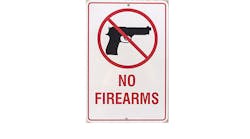One of the hottest controversies polarizing the public debate in recent years is gun control, and the topic of guns in the workplace and public businesses continues to be a front-burner issue.
The most prevalent of these are the “parking lot” laws that allow employees to keep guns in their vehicles parked at the plant or office building where they work. Today 26 states have adopted such laws, although specifics of the laws vary from state to state following a string of high-profile cases where employees were fired after guns were found in their parked cars.
“The thought that someone at your workplace may be armed can be startling, but you should be careful to avoid implementing policies that violate state laws protecting the rights of gun owners,” warns attorney Andrew Rogers of the law firm of Littler Mendelson in his written essay answering a query put to him by an employer in Tennessee.
Tennessee’s parking lot law offers a useful example. It prevents employers from prohibiting any individual with a handgun carry permit recognized by the state to store a firearm and ammunition in his or her car parked on the employer’s property, subject to certain conditions.
The vehicle must be parked where it is allowed to be. While the permit holder is in the vehicle, any firearm or ammunition must be “kept from ordinary observation.” When the permit holder is not in the parked car or truck, the firearm or ammunition must be secured in the locked vehicle—in the trunk, glove box or a container attached to the vehicle.
As long as employees are able to satisfy these requirements, an employer in Tennessee cannot lawfully prevent them from storing a handgun in their cars. If you have operations in several states, you should research and review the parking lot laws that may apply to those locations, Rogers recommends.
Other states have imposed conditions similar to those required by Tennessee, but a few are less restrictive. Many states’ parking lot laws do not require employees to have licenses or permits for the guns they are storing in their vehicles.
Almost all of the states with parking lot laws explicitly allow an employer to prohibit firearms in a company-provided vehicle. In fact, no state specifically allows employees to store firearms in company vehicles. In addition, there are a myriad of other exceptions unique to different states, Rogers notes. In Georgia and Arizona, any parking lot owned by a U.S. Department of Defense contractor is exempt from their parking lot laws.
Parking Lot Restrictions Vary
Several states have imposed additional restrictions as well. Georgia also exempts certain entities from the state parking lot law, including jails, electric utilities and any employer with a parking lot next to facilities providing natural gas, liquid petroleum, water storage and vital law enforcement services.
Utah and Florida maintain similar exemptions for school premises, religious organizations, government entities and single-family homes. Similarly, in Utah, Arizona and Louisiana, if employees are provided an alternative parking lot at no additional charge for vehicles with weapons, or a secure storage location where employees can store their firearms prior to taking a vehicle into the secured parking area, then an employer may be able to prohibit the storage of firearms in one of their parking lots.
Keep in mind that nearly half of the states have not enacted laws to address this issue. If you operate out of Connecticut, New Mexico, North Carolina or Virginia, for example, an employer can restrict the presence of firearms in company parking lots. In other states, such as Colorado, the law is less clear.
Employees are not entitled by statute to secure firearms in their vehicles in these states, and employers and property owners retain broad authority to prohibit the practice. However, in the absence of a policy clarifying the employer’s position on the possession of firearms and ammunition, employees may be allowed to carry firearms if they are in accordance with federal and state law.
As a result, if an employer wishes to impose any restrictions, it would be important to develop a policy addressing the possession of weapons, including firearms, on its premises, Rogers says. The employer also has much firmer ground to stand on in the case of keeping guns out of the workplace even in situations where they are allowed in parking lots.
“State legislatures have overwhelmingly determined that employers should be allowed to restrict firearms in the workplace, consistent with the traditional property rights,” Rogers points out. While property owners are generally presumed to be able to exclude individuals from their property, 24 states have passed laws explicitly allowing employers to prohibit firearms on their premises.
In Tennessee, for example, an individual, corporation or business entity is allowed to prohibit the possession of weapons by employees at a workplace. To take advantage of this law, employers must post notice of the ban to all affected employees. Some states, like Nebraska and Minnesota, require that the employer personally request that someone carrying a gun on their property remove it from the premises.
Many states require that employers post proper signage if they prohibit firearms on private property. In Tennessee, the property owner must display a notice stating, “NO FIREARMS ALLOWED” along with a specific pictorial representation of the phrase, both of which must be rendered in a specific size.
The sign must be posted in prominent locations, including all entrances primarily used by people entering the property, and must be plainly visible to the average person. Some states are not as strict as Tennessee in their signage requirements. Missouri requires only that the sign be no smaller than 11 by 14 inches, and the writing not be less than one inch. Even less strict are North Carolina and New Mexico where, while signage can be used to prohibit firearms on private property, there are no requirements relating to the contents or design of the signs.
Rights and Risks
“Employers should also be aware that certain states treat firearm ownership as a pseudo-protected class,” Rogers asserts. In Indiana, an employer cannot require a job applicant to disclose firearm ownership, and cannot condition employment on limiting the employee’s rights, including the right to store a gun in a locked vehicle.
In Georgia and Florida, employers cannot condition employment on an employee’s agreement to forego bringing firearms into the employer’s parking lot. North Dakota also prohibits employers from discriminating against an employee for bringing a firearm onto the premises if the firearm is never displayed for a purpose other than defense.
Gun control opponents point out that in many cases in the recent past where active shooters have been firing on employees and schoolchildren in educational facilities, the shooters have been stopped by an employee on premises with a gun.
However, Rogers also warns that employer liability stemming from their workers’ possession of firearms remains a valid concern in many cases. Fewer than half of the states with parking lot laws have provisions protecting employers from liability for injuries caused by firearms in the employer’s parking lot.
Tennessee says employers are not liable for any harm or injury that occurs because someone stored a handgun in a locked car. “Thus, in Tennessee, an employer would have a defense against liability if a stranger trespassed into an employer’s parking lot, stole a gun stored in an employee’s car, and injured someone with that weapon,” Rogers explains.
Only a handful of states address a related question: If an employer chooses not to restrict firearms at their facilities or parking areas when it could lawfully have done so, should it be liable for injuries resulting from a firearm in its workplace?
Once again, Tennessee is among the states that have a law answering this question, according to Rogers. State law exempts employers from liability for any damage related to gun use on their premises, even in instances where employers failed to implement a policy prohibiting weapons on their property.
For example, if an employer allowed its employees to conceal and carry guns in the workplace and an employee injures someone, the employer isn’t likely to be held liable for not prohibiting the firearm on its premises. Similarly, Kansas and Ohio have laws protecting private employers from liability if they do not prohibit firearms on their property. Ohio and Tennessee only protect against civil liability.
The political controversy over gun control in all of its aspects is not going away. Employers need to arm themselves with knowledge of the laws in their states before taking actions to restrict their use on premises and if employees park on company-owned property.

